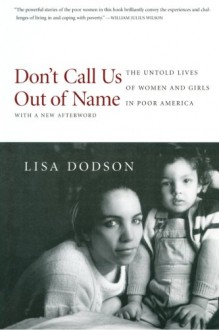A radically new vision of women and girls living below the poverty line; Lisa Dodson makes a frontal assault on conventional attitudes and stereotypes of women in poor America and the seriously misguided "welfare reform" policies of the end of the century."I hear Odessa, a thirty-two-year-old...
show more
A radically new vision of women and girls living below the poverty line; Lisa Dodson makes a frontal assault on conventional attitudes and stereotypes of women in poor America and the seriously misguided "welfare reform" policies of the end of the century."I hear Odessa, a thirty-two-year-old woman, speak at a forum on welfare reform. I ask her about the phrase she used, 'Don't call me out of name,' for it seemed to speak for a whole nation of people. Odessa tells me that women who have no money and no one to stand up for them get put into a bad position and they get misnamed. Most often they get called 'welfare mothers' or 'recipients,' words she will no longer acknowledge. With millions alongside her, Odessa has emerged by her own strength and some opportunity, and now she insists upon naming herself."While Lisa Dodson was working in a Charlestown factory twenty years ago, the stories of the women she worked with daily captivated her; she listened to them speak about harsh lives and their deep commitment to family and community. It was the beginning of Dodson's desire to learn the truth and write it down.For over eight years, Dodson has been documenting the lives of girls and women-hundreds of white, African-American, Latino, Haitian, Irish, and other women in personal interviews, focus groups, surveys, and Life-History Studies. This book is a crossing--a class crossing--taking readers into fellowship with people who are seldom invited to speak but who have powerful stories to tell and who force us to abandon common myths that have been fed to us by the media about school dropouts, teen pregnancy, and welfare "cheats." Don't Call Us Out of Name delves deeply into the realities of their lives, often with surprising and uplifting stories of commonplace courage, unimaginable strength, and resourcefulness. Lisa Dodson does not simply give us the truth about women living in poverty but offers realistic hope for meaningful policy reform based on the experience and analysis of the women we have seen so far only in stereotype and whose voices we have not truly heard. These women emerge as critical contributors to the creation of sound, humane public policy.
show less

